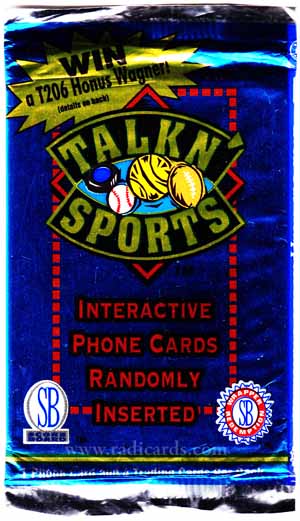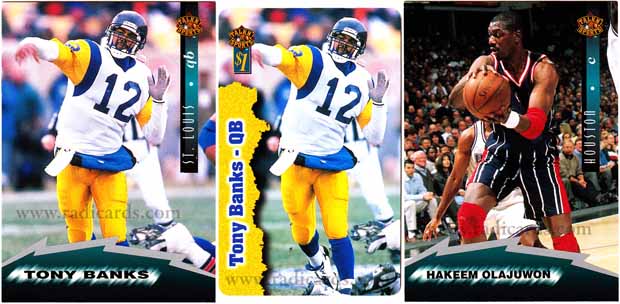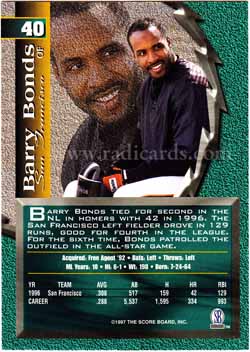
While digging through a local shop’s inventory of old product, I found a pack of 1997 Talkn’ Sports. In all of the years I have been in this hobby, I have never seen this product before. Just when I think I’ve seen everything, I find something else.
The phone cards thing is such a product of the ’90’s. It was an interesting idea for the time but it lacked longevity. As we’ll see here in a bit, the phone cards are of unconventional size.
I have seen many different phone cards over the years but never really knew anything about their origins. All I knew was that most of them came from the ’90’s and I have never been a big fan of them. In my opinion, they are rather garish. What I did like, however, was that even these phone cards had chase parallels. The base cards often carried some nominal value i.e., $1 worth of minutes. To my knowledge, you could actually use these cards to make phone calls. I can’t say this with any degree of certainty, however, as I have never used them. Parallel phone cards carried a larger monetary value, commonly $5, $10, and up. For obvious reasons, the parallels were scarcer to pull.
Another dated hobby trend is the 4-sport product. This is one of that nature. It’s nice to open a pack and see a variety of sports. This sort of release style caters to those open collectors that like it all. That group still exists today so there is a strong probability that, if positioned correctly, a 4-sport release would still be relevant. Although, I’m not sure if the phone card idea would go over as smoothly with the current market as it once did in the distant past.
Just off the top of my head, one idea that may be a possibility would be to pair a product with iTunes gift cards. This would use the same concept as the phone card but instead of phone minutes, you can pull $1, $5, and $10 iTunes credit cards that feature pictures of the players on the cards. Just a thought here, nothing more.
The Packaging:
The blue foil with red text and gold logo is poppy. The sports ball images are the focal point of the front of this pack. When I saw this pack, all I saw were those four images; I didn’t even bother to read the text stating the content description. The header text in the top-left quadrant of the pack also caught my attention. The text to which I am referring is, WIN a T206 Honus Wagner! As exciting as it sounds, it’s no longer even a twinkle of a possibility given that the redemption program for this particular promotion is way long past its expiration date.

Let’s talk about redemption programs for a moment. If implemented optimally, these programs provide for some degree of manageable feasibility in terms of program submission and possible winnings. What I have noticed, however, is that the bigger the prize, the more complex the program. This product offers one of those programs and it is horribly convoluted and as such, almost impossible to become a winner.
I still find a chuckle in the phrase, trading cards. It’s such a staple of my youth. I cannot think of an instance in today’s market where any product would welcome that phrase on any packaging. In a time when major brands are routinely releasing products with a $60+ per pack SRP, the phrase trading cards hardly describes its contents. I will say this, however, in the most primitive of definitions, the term trading cards does in fact define all products being released, no matter the price point. When I hear this phrase, I think of kids trading ’88 Score or ’92 Topps with their friends out on the school yard during recess in grade school. The very nature of their activities, is in fact, trading cards.
The Base Design:

How funny is it that of the 4 base cards and 1 phone card that this pack possessed, it hosted two Tony Banks cards; one base and the other a phone card. Go figure! That they used the same image for both cards is a nice touch. It’s consistent with the classic parallel concept. The base design is rather kitschy. That green name plate with the gray lightning bolt thing happening over the top border isn’t strong by nature of aesthetic design. It might have worked for the time though. The white scribble behind the name is fair because it does guide the eye toward the name and it has a high degree on contrast on the green brick that is the name plate. I like the dark green to black gradient being used here. The phone cards possess a somewhat stronger design in comparison. The text has an outer-glow and is positioned unconventionally vertical.

The backs feature the same theme as the front with the green/black gradient and edgy border. It’s still a staple of the ’90’s. The portrait to portrait player photo idea has been used on many products over the years. I actually like this idea despite it’s unoriginality. Another product that features this concept is the famous 1997 Flair Showcase; a more boutique product released during the same year.
Final Thoughts:
The Phone Card fad was a short lived one. Apparently the market in 1997 was making enough phone calls to necessitate a co-branding opportunity with the card collecting industry. This product was one of many that featured interactive phone cards. For a product that featured this type of offering, I’m not convinced that it was all that popular. I say this for two reasons:
- I have never heard of it before I found this pack in June of 2012.
- There is a call to action on the front of the pack stating the possibility of winning a T206 Honus Wagner – the holy grail of all of sports cards.
If you need to provide that kind of incentive to buy your product, you can almost bet that what you have is weak market value. Remove that call to action and what you have is essentially a missed opportunity likely close to 100% of the time. What I mean by this is that buyers would have likely had much less desire to buy this product without the prize potential. Although that statement can be generalized, it doesn’t have to be if the contents within the package are quality in nature. Redemption programs are abundant even in today’s market, but they shouldn’t be the primary driver of market activity.
All in all, an interesting release, but not that interesting. Something different but not all that unique. Inexpensive but likely often over-looked. Although the phone card thing never really caught on, it was entertaining for at least a brief minute in the late 1990’s.
To see what’s currently on eBay from 1997 Talkn’ Sports, click here.

 Have you visited our store? Click here.
Have you visited our store? Click here.



I remember the company Scoreboard who put this product out (i live about 5 miles away from their former headquarters). This was right about the time where the company started to get to get too big for its britches and were putting out some really sub-par products. If I’m not mistaken, the company still exists today mostly dealing with memorabilia and auto’d items. Great blast from the past Patrick. Thank you! Oh, and by the way, did the pack list the odds of pulling a Honus Wagner? Thanks again for another great read.
Regards,
Bryan
Hi Bryan,
Thanks! It’s interesting when a company that’s making big bucks decides to release a low-end product. I suppose this idea has potential to pan out favorably by way of attracting an additional market segment but it’s actions like this that risk the company’s brand image. I would have to at least hope that this concept was considered. If the company can capitalize on an additional market base, however, I suppose releasing a low-cost product isn’t such a bad idea. When I was a kid, I could only afford what my allowance would cover. In that instance, I would have enjoyed a cheaper product because it was within my reach financially.
Regarding your question about the odds of pulling the Honus Wagner Redemption Card, I have updated this post to include a full description of the redemption program. The program isn’t as easy as just pulling the card. The program consists of pulling a card, entering a contest, and answering trivia questions. It’s all there if you’d like to read it 😉